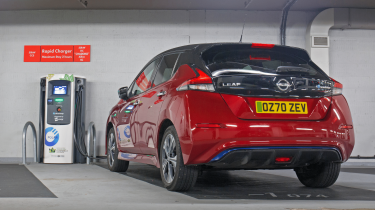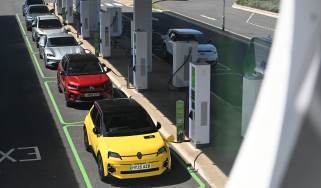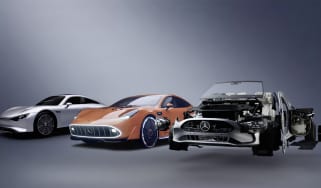Government to review ZEV mandate following car industry upheaval
An initial consultation with industry leaders will feed back and culminate in a decision in January

The government has announced a review into the controversial ZEV mandate after major pushback from across the car industry, with the next steps expected to be laid out in January.
The Business and Trade Secretary, Jonathan Reynolds, told the annual Society of Motor Manufacturers (SMMT) and Traders annual dinner that “the [car] industry is facing a greater set of challenges today than any point in the last 50 years.”
Referring to the ZEV mandate put in place by the previous Conservative administration, Reynold said “I don’t believe the policies we have inherited are operating today in a way anyone intended them to” and that he was "profoundly concerned” by the current state of the market.
Now, after meeting with industry bosses and the SMMT last week, the government has announced a full review into the ZEV mandate, which will involve a consultation period with senior figures, reporting back and culminating in a final decision in January 2025.
As it stands, the UK’s ZEV (zero-emissions vehicle) mandate, which was enacted at the beginning of 2024, requires that 22 per cent of vehicles sold by each manufacturer this year must be fully electric or have zero tailpipe emissions. This threshold will rise further to 28 per cent in 2025 and keep rising each year up to 80 per cent in 2030.
Manufacturers that do not comply face hefty fines, as high as £15,000 per vehicle over and above the government’s stated quota, with Ford stating that it may resort to limiting the sales of its petrol, diesel and hybrid-powered vehicles in order to escape being penalised.
At this stage, very little is known about what, if any, changes the government will announce come January. However, it’s unlikely any adjustments will be made to the pre-defined thresholds, instead we expect the main focus to be on expanding the methods in which a manufacturer can comply; existing rules already allow firms to offset their imbalance of ICE and EV sales by purchasing credits from other companies or overdelivering on future quotas.
Reynolds did hint at the concept of potential government-funded EV incentives, but offered no guarantees and encouraged figures from across the industry to submit their own ideas.
The Business Secretary also took the time to double-down on the Government’s commitment to the old 2030 phase-out of the sale of internal combustion-engined cars, stating that he doesn’t want the consultation to “undermine the transition [to EVs]”. However, Reynolds reassured carmakers that it “matters to [him] and the government that vehicles are made here. It’s incumbent on us to put the money where our mouth is.”
All of this comes in the wake of several major automotive manufacturers cutting and threatening to cut jobs in the UK in order to save cash as they are forced to sell EVs at a loss in order to meet the government’s targets.
Vauxhall, for example, plans to close its historic Luton manufacturing plant, citing slow EV sales and the ZEV mandate as its reasoning. This appears to mirror the rhetoric of Maria Grazia Davino, the boss of Stellantis (the owner of Vauxhall), who earlier this year cautioned the government that “if this market becomes hostile to us, we will enter an evaluation for producing elsewhere”.
Nissan, which also produces vehicles such as the top-selling Qashqai in the UK, recently called for “urgent action from the Government by the end of the year to avoid a potentially irreversible impact on the UK automotive sector”.
After cutting as many as 800 jobs in the UK, Ford’s UK managing director, Lisa Brankin, said the firm “welcomes” the concept of a review and is “pleased that the government is listening to industry at this crucial time.” Brankin also called for “greater flexibility” in the ZEV mandate scheme, as well as “government-backed incentives to help encourage customers to make the switch”.
However, Professor of Business and Sustainability at Cardiff University and Director of the Centre for Automotive Industry Research, Peter Wells, warned Auto Express that any softening of the ZEV mandate “may be politically expedient, but environmentally disastrous”.
“It cannot be emphasised enough that we really are on the brink of a catastrophic climate crisis in which the automotive industry has long been a big part of the problem, and must be part of the solution,” Wells continued. “It seems inevitable that the solution is fewer cars, smaller cars, less powerful cars, and always fully electric cars. There is a major opportunity for electric light commercial vehicles, and it is here that more government support could be justified.”
How much is your car worth? Find out with our free car valuation tool...









